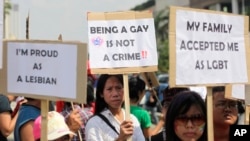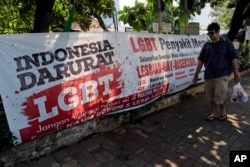Adhe Jengker marched among 4,000 others at the Women’s March in Jakarta Saturday. A tall trans woman in her late 20s, Jengker carried a poster that said “The Future is Non-Binary.” She came with five other women from the trans community, hoping to raise more awareness about trans women in an increasingly conservative Indonesia.
“I went down to the street and participate in Women’s March because I realize, as a transgender, our rights have not yet been fulfilled by the government. Our space is becoming more limited,” she told VOA. Jengker, a professional makeup artist, is also concerned because trans women often face discrimination and persecution, especially those who are sex workers.
Like Jengker, Vanessa Chaniago is worried. She sees increasing incidents of violence against the trans community, especially during this political year. Indonesia has just concluded its presidential and legislative elections.
“I’m here for other trans women who are discriminated against. I want that violence against us will eventually decrease, and I hope there will be justice for the women in trans community and my friends in the LGBTIQ community,” Chaniago said.
Dena Rachman, a former child artist and renowned trans activist, participated so that trans women can have more visibility in the public space. She said that they have very limited space to be able to express themselves as a human being.
She also lamented the fact that so many people in the trans community are denied access to their basic rights of education and health care.
“What we experience as transgender here is a systematic discrimination. Because of the system we are excluded from the society, that’s our main concern,” she said.
Violence against the trans community
Khanza Vina, an activist from Young Trans Women Studio (SWARA), an NGO that focuses on empowering trans women, said there are more than 700 recorded cases of violence against people in the LGBTIQ community since 2016.
“These cases including discrimination, violence, eviction from their own homes,” she told VOA.
In one case involving trans women last year, 12 who worked at different hair salons in Aceh, Indonesia’s most conservative province, were arrested by the police. Their heads were shaved and they were beaten and paraded around the neighborhood and forced to denounce their female identity.
In May last year, four trans women in Cianjur, West Java, were detained by people from a hardline Islamic organization, they were interrogated and forced to take off their clothes. The video later became viral on social media. Meanwhile in Bekasi, West Java, last November, two trans women were beaten and harassed.
Politicization of the LGBTIQ community
Vina believes one of the reasons trans women and people from the LGBTIQ community are increasingly persecuted is because of the identity politics used by politicians to win the hearts of conservative voters.
“This identity politics ends up covering up or justifying cases of violence against trans women. None of the two presidential candidates dared to say stop discriminating against minority groups,” she said adding that minority groups are becoming less and less visible.
During the Indonesian presidential election, supporters of opposition candidate Prabowo Subianto spread a rumor that incumbent President Joko “Jokowi” Widodo would legalize gay marriage if re-elected.
Before that, the speaker of People’s Consultative Assembly, Zulkifly Hasan, openly stated that he is against the LGBTIQ community.
“I’m not against the people but the behavior of LGBT. It’s a depraved activity and will negatively impact the society,” he said in January.
According to Julia Suryakusuma, an author and feminist activist, since the beginning of 2016, there has been a moral panic directed at the LGBT community in Indonesia.
“This moral panic is not dissipating and it is clearly connected with the rise of conservative Islam in the Indonesian political arena,” she wrote.
Attempts at criminalization
Last year, some factions in the Indonesian House of Representatives (DPR), who were trying to gain conservative votes ahead of the Indonesian election, proposed to impose restrictions on same-sex relationships and consensual premarital sex in the revision of the Criminal Code.
In 2017, the Family Love Alliance (AILA), a conservative group, filed a petition to the Constitutional Court to criminalize the LGBT community in the Indonesian law. The petition was rejected with a dissenting opinion, 5 out of 9 judges ruled against the petition.
With the attempts to criminalize people based on their sexual preference or gender identity, Vina mentioned a growing reluctance to use the term of LGBTIQ even within the civil society’s movements.
“People are afraid to use the terminology of LGBTIQ, for example in an event because they don’t want the conservative groups to disband the event,” she said.
“But I don’t want fear to divide us. And I hope people will stop using our identity as political commodity. Look at what hatred can do to the people in the trans community, we’re also human beings,” Vina added.






